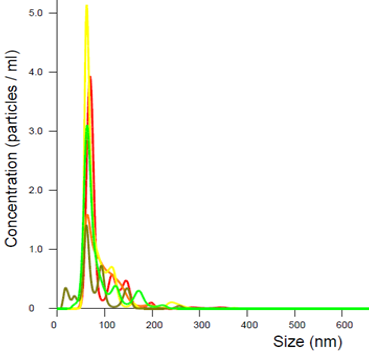Aggregation rate determination
Overall aggregation rate is the cumulative increase over time of the aggregate concentration of bigger size. It is the rate of the transfer of aggregates from the bin (size interval) of smaller diameter to the bin of larger diameter.
 |
1. Measure particle distribution two subsequent times (t and t-1).
2. Compute the aggregation rate 3. Compute e.g. 1st order aggregation rate constant λagg. |
Mechanisms & Methods |
Used for |
|
This procedure is valid if particles are neither added nor removed from the system and particle size is not influenced by other processes. Particle size distribution can be determined by NTA, DLS and ELS. Exploring the time evolution of the aggregation rate requires multiple measurements across time points. This can be performed by NTA with sample loading from an autosampler. A 96 deep well plate allows experimental design of large time series or multiple repeat measurements of a single sample. |
|
Read more |
Read also |
|
Visit the NanoFASE Library to read summaries of these reports: |
|
Contact

Kamil Nešetřil
Technical University of Liberec (TUL)
Email: kamil.nesetril@tul.cz

